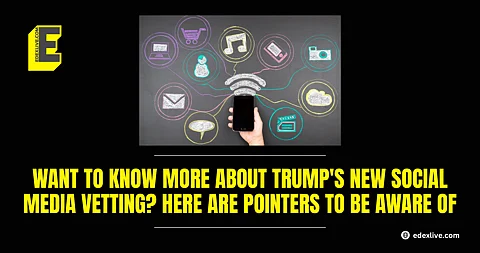

President Donald Trump has directed US embassies to cease scheduling new student visa interview appointments as part of a plan to implement stricter social media vetting for visa applicants. This has left applicants uncertain about their academic plans while being extremely cautious about their social media presence.
Understanding 'Social Media Vetting'
A report by Financial Express explained that social media vetting involves reviewing an applicant’s online activity on social media platforms, such as Facebook, Instagram, X, LinkedIn, and TikTok, to identify security risks and verify application details.
Since 2019, applicants have been required to list all social media accounts used in the past five years, which are cross-checked for signs of extremist affiliations, visa fraud, or inconsistencies in identity or education history.
Here is what you should avoid!
1) Avoid antisemitic or extremist content
The US Citizenship and Immigration Services (USCIS) announced in April that the Department of Homeland Security (DHS) will enforce immigration laws to bar individuals linked to extremist groups or those supporting antisemitic ideologies, or organisations, like Hamas, Hezbollah, or Ansar Allah (the Houthis). Applicants should avoid related content.
2) Exercise caution with pro-Palestine content
The DHS has flagged content related to Palestinian Islamic Jihad for scrutiny. President Trump has emphasised that students involved in campus protests, especially pro-Palestine ones, may face visa denials. Applicants should avoid posting about such topics.
3) Steer clear of misleading or inflammatory posts
Online activity is now critical for visa approval. Students should avoid posting offensive or misleading content, and review their social media privacy settings.
4) Importance of accurate information
Applicants must ensure that their visa application details match their online profiles. Discrepancies could lead to rejection. The USCIS has directed top officials to thoroughly vet applicants using all available tools.
5) Additional reviewing for high-risk areas
Applicants from high-risk regions, such as war zones, may face increased scrutiny. Online content should be truthful and consistent with visa applications.
